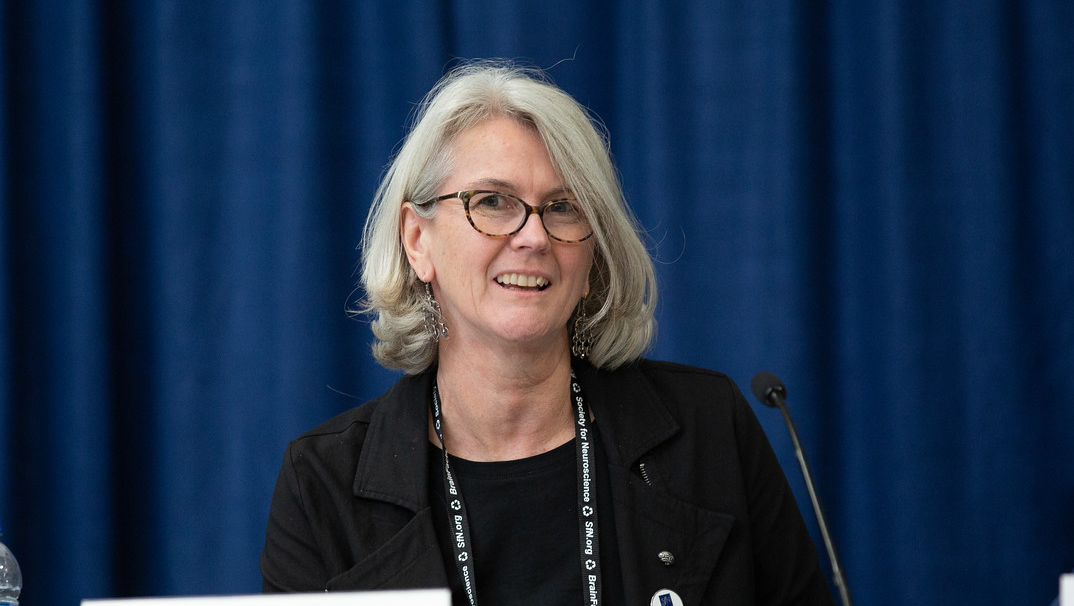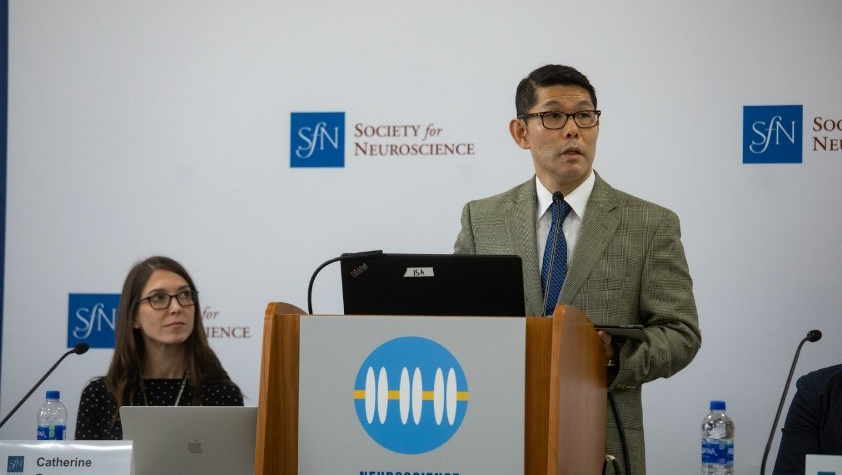Q&A: President of FENS on Partnership with SfN
The Federation of European Neuroscience Societies (FENS) and SfN are working together in a number of areas where the two societies are aligned and resources can be leveraged. Neuroscience Quarterly (NQ) interviewed Carmen Sandi, FENS president 2018–2020, to learn more about how members of both organizations will benefit from joint activities and collaborations.
NQ: In 2017, FENS and SfN entered into a three-year Memorandum of Understanding (MoU) to help the two organizations focus on collaborating more effectively on key issues including training, advocacy, and research using animals. Can you share more about this endeavor overall, and how you foresee the development of joint and complementary resources, where both Society’s areas of focus overlap that will be of value for both organizations’ members?
CS: As FENS president, I greatly appreciate the longstanding practice of transparent and trusted dialogue between FENS and SfN about our shared priorities in supporting the neuroscience community. Over the years, this robust relationship has led to several collaborations including the FENS-SfN summer schools and different advocacy-driven programs.
Based on mutual interest in further expanding this partnership, FENS and SfN, under the leadership of my predecessor, Barry Everitt, agreed on the current MoU as an ideal and flexible platform for expanding and enriching our collaboration. I am very excited about this partnership that is already delivering important results on several fronts, such as the support of transparency in the use of animals for biomedical research and a range of training resources developed in partnership between the FENS and SfN training committees. Further steps for expanding access to these new resources and for the development of additional shared programs are planned for 2019.
In summary, the MoU provides a framework for the efficient collaboration between FENS and SfN that recognizes the shared responsibility of both organizations towards our respective members and the neuroscience community at large.
NQ: You have shared that during your term as FENS President, you intended to focus on ensuring representation of all neuroscience disciplines and with special attention to underrepresented fields. Can you elaborate on what steps FENS is pursuing toward this goal?
CS: FENS has already gone a long way in the past decade in progressively integrating the diversity of neuroscientific disciplines into the FENS Forum program schools, conferences and all other activities. However, there is still room for improvement as colleagues working in some areas still consider that representation of their research field is not yet at the level they would like to see. We will soon launch the call for Symposia for the Forum 2020 in Glasgow and will encourage proposal submissions from all fields.
Moreover, we will identify which areas remain notably underrepresented and will invite key societies and groups representing those communities to participate with mini-satellites (mini-conferences) that will take place very close to the start of the forum. With this, I expect to attract neuroscientists that normally do not consider the FENS Forum as relevant to their field, as I hope that having a focused satellite would be a strong incentive to participate and stay over on the following days.
NQ: This month, SfN is hosting a two-day professional development virtual conference focused on mitigating implicit bias which will include panel discussions and a daily, facilitated wrap-up discussion. You’ve stated that promoting gender equality is an important focus of yours during your presidency. Please share your thoughts on how encouraging programming like this among the scientific community and our memberships may bring about positive change.
CS: One of the main problems regarding gender inequality in science and academia is the too frequent lack of information and awareness on the matter in our scientific communities. In order to be able to counteract implicit biases effectively, it is extremely important to be aware of them, well trained to identify them, and knowledgeable on effective counter measures to be applied.
In this regard, I consider the upcoming professional development virtual conference focused on mitigating implicit bias that SfN is hosting an outstanding way forward to mitigate that lack of knowledge, and to promote a healthy and effective culture. I also think that the selected program for the occasion is very attractive. Being exposed to different points of view through panel discussions are excellent catalyzers, not only to enhance our background knowledge on the topic, but also to develop our own opinions. The impressive outreach that virtual conferences provide is a great way to ensure a large-scale impact in our scientific communities. Of course, we should complement this type of action with actual networking meetings, such as luncheons organized during the scientific meetings.
NQ: Students and early career scientists are vital to the rapid growth of neuroscience disciplines and will shape the future of the field. Greater attention to developing young investigators is important to FENS, as it is to SfN. Can you describe your plans for encouraging their development as scientists, science advocates, and leaders; and what opportunities and challenges exist in this growing field for early career scientists?
CS: The development of science advocates and next generation leaders is an important responsibility of scientific societies such as FENS and SfN that add great value to the neuroscience community in Europe and worldwide. A key mission of FENS is accompanying and supporting researchers throughout their career in order to help them become the leading neuroscientists of tomorrow. I believe communication and exchange of information is becoming even more vital to this goal, including with non-science stakeholders and communities.
FENS aims to inspire scientists to share their findings with their fellow researchers and get involved in FENS and our partners’ activities at every point in their careers. To accomplish this, we offer a comprehensive portfolio of training activities meant to contribute to the professional development and exchange of information of young and experienced scientists alike.
We organize a number of high-quality training courses and scientific meetings together with SfN and other partners. For masters and PhD students, the FENS summer and winter schools (respectively organized in partnership with SfN and The Hertie Foundation) and for those at a later career stage, The Brain Conferences (in partnership with The Lundbeck Foundation) give a broad overview on carefully and timely selected topics, as well the opportunity to meet leading scientists in the field in laid-back environments which foster networking.
The Network of European Neuroscience Schools (NENS) exchange program gives European students the opportunity to learn new training methodologies in labs outside their countries. Experience abroad, enhanced mobility and the possibility to exchange and share best practices among labs are just few of the advantages offered by NENS.
Finally, FENS has partnered with International Brain Research Organization, the Gatsby Charitable Foundation, the University of Bordeaux and the Champalimaud Foundation to offer the CAJAL Advanced Neuroscience Training Program, which expands neuroscience training activities in Europe by providing state-of-the-art hands-on courses.
NQ: Pursuing animal research and openly communicating about its importance and value among scientists and the public is a growing need in neuroscience and across scientific disciplines. This may be even more important now as mounting public health challenges including Alzheimer’s disease, mental health disorders, and addiction demand new advances in science and medicine in order to continue to make progress. How do you envision the partnership between FENS and SfN, with respect to communicating around animal research issues, driving important dialogue on this subject?
CS: I believe that the key to increasing public support for the use of animals in research is increasing public awareness. Therefore, we must be willing to communicate more transparently about the research we undertake and the challenges and opportunities we encounter along the way.
Through our respective committees on animals in research, FENS and SfN already frequently work together on topical position papers and this collaboration will only become more important moving forward as we seek to raise public understanding of the value of animal research.
One of the key projects supported by FENS and SfN under the MoU in 2018 was a series of public workshops organized by The European Animal Research Association (EARA) across Germany aiming to help researchers and institutions prioritize openness when communicating about animal research. By supporting such projects, FENS and SfN are positioning themselves at the forefront of this ongoing debate. I look forward to developing these activities further in 2019.























